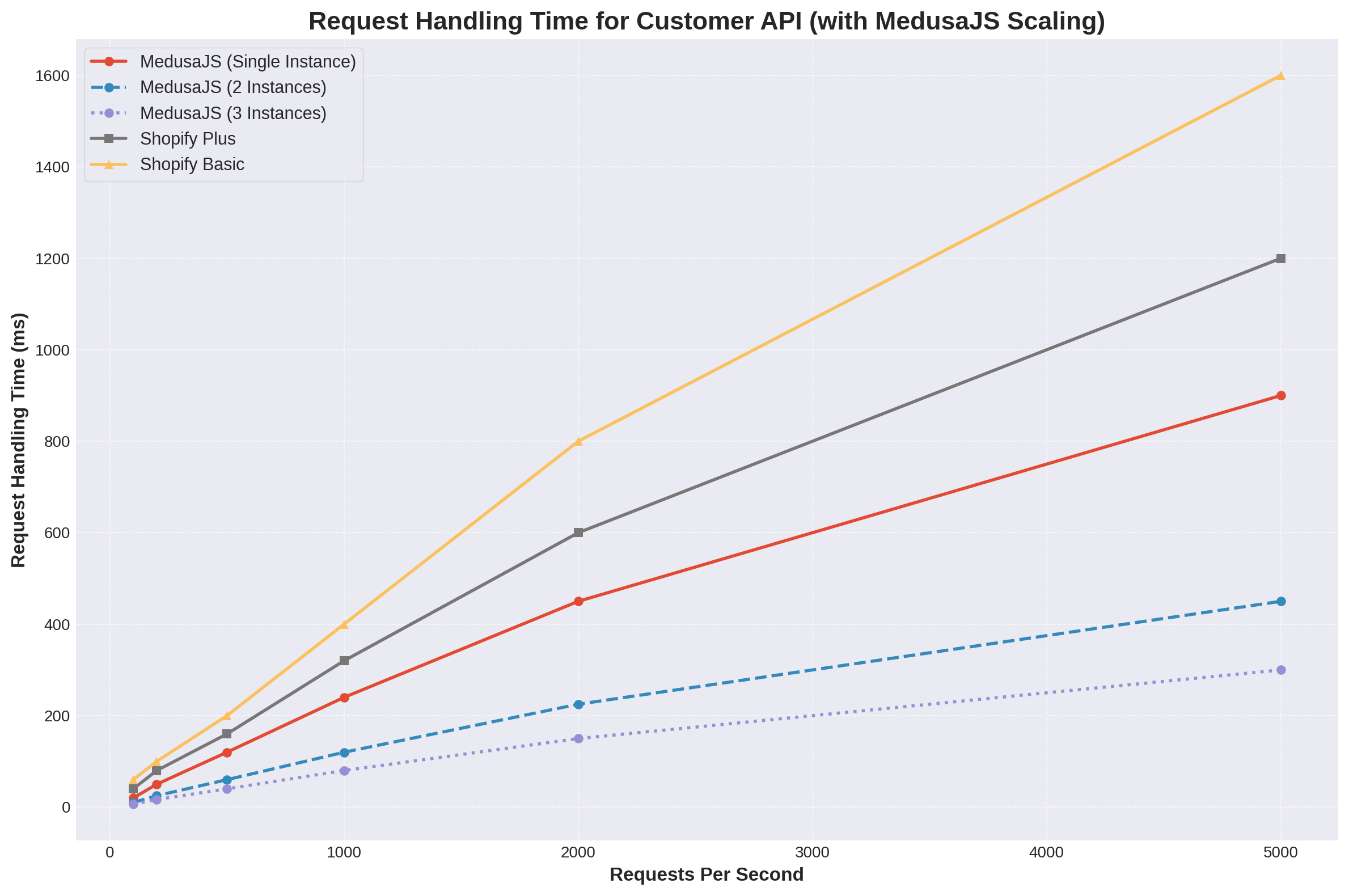Backend Performance: Shopify vs. MedusaJS
When selecting an eCommerce backend, performance, scalability, and branding flexibility are critical considerations. This article examines the backend capabilities of Shopify and MedusaJS, assuming both use Next.js for the frontend. For medium-sized businesses and corporate clients, MedusaJS stands out due to its streamlined architecture, dedicated or dynamically allocated resources, and seamless brand design integration. MedusaJS especially excels in handling traffic during major sale events like Black Friday, Christmas, and New Year sales, outperforming Shopify’s shared resource model.
1. Performance During High-Traffic Events (e.g., Black Friday, Christmas, New Year Sales)
Shopify Backend
- Scalability: Shopify uses a shared resource model to handle high traffic through distributed infrastructure. However:
- Checkout Delays: Shopify's architecture introduces logical layers that can slow down user interactions during peak demand.
- API Rate Limits: Shopify enforces strict limits (2 calls/second for Admin API, 100 calls/second for Storefront API), which can hinder performance for high-demand headless implementations.
- Shared Resource Contention: Traffic spikes across Shopify stores, such as during Christmas and New Year sales, can indirectly affect performance for individual businesses.
MedusaJS Backend
- Scalability: MedusaJS, when implemented with dedicated resources or Kubernetes for corporate clients, ensures smooth operation:
- Dedicated Servers: Medium-sized businesses benefit from predictable, consistent performance with dedicated hardware.
- Dynamic Resource Allocation: For corporate clients, Kubernetes orchestrates resources dynamically based on traffic demand. This ensures that resources scale as needed, minimizing waste and keeping costs aligned with actual usage.
- No Shared Contention: Traffic spikes are isolated, ensuring performance is never compromised by other businesses.
- Advantages:
- MedusaJS handles events like Black Friday, Christmas sales, and New Year sales seamlessly, ensuring zero performance degradation and smooth user experiences.
2. Speed of API Responses
Shopify Backend
- Shopify's API response times are optimized for shared environments but are inherently slower due to shared resources and logical layers:
- Typical response times are 100-200ms, with variability under high loads.
- API limits can further impact performance during data-intensive operations, especially during high-traffic sale periods.
MedusaJS Backend
-
MedusaJS on dedicated or dynamically allocated infrastructure delivers superior API performance:
- Typical response times are as low as 50ms, with consistent results even under heavy traffic.
- Kubernetes setups dynamically allocate compute and memory resources to maintain fast response times during events like Christmas or New Year sales.
-
Custom APIs:
- MedusaJS supports tailored API endpoints, eliminating unnecessary abstraction layers and optimizing data flow.
Below is a graphical representation of comparison.
2 instances option is the sweet spot, preventing any customer to experience freezes longer than a quarter second even in spikes. Below is a comparison, lower is better.

3. Seamless Brand Design and Flexibility
Shopify Backend
-
Shopify offers limited branding customization due to its templated checkout and shared architecture:
- Checkout flows and payment processing are tied to Shopify's infrastructure, often resulting in disjointed user experiences.
- Advanced customization requires the $2,300/month Plus plan, which is overkill for most businesses.
-
Impact on Brand Identity:
- Shopify's shared architecture and templates restrict the ability to create fully seamless brand experiences.
MedusaJS Backend
- MedusaJS provides unparalleled branding flexibility:
- Payment processing and checkout flows are fully customizable, allowing for seamless integration with the brand's identity.
- Dedicated and Kubernetes-powered setups eliminate shared infrastructure constraints, enabling a cohesive and tailored customer journey.
- Corporate Benefits:
- Kubernetes ensures every aspect of the backend dynamically adjusts to support branding and performance goals, even during fluctuating traffic levels.
We specialize in delivering fully customizable MedusaJS setups that align with unique branding requirements, ensuring a seamless and professional customer experience.
4. Cost and Resource Efficiency
Shopify Backend
- Shopify’s pricing structure is heavily influenced by its shared infrastructure:
- The $79/month plan lacks flexibility for scaling medium-sized businesses.
- The $2,300/month Plus plan offers features like priority APIs and checkout customization but comes with unnecessary overhead for most businesses.
- Transaction fees further increase costs unless Shopify Payments is used.
MedusaJS Backend
- MedusaJS implementations leverage dedicated hardware or Kubernetes for maximum cost-efficiency:
- Dedicated Infrastructure for Medium Businesses: Predictable hosting costs, typically $100-$200/month, with no hidden fees.
- Kubernetes for Corporate Clients: Resources are dynamically allocated based on demand, meaning businesses pay only for what they use, even during high-traffic periods like Black Friday, Christmas, or New Year sales.
- By avoiding shared infrastructure, businesses retain full control over costs and performance.
MedusaJS ensures businesses scale sustainably, paying only for the resources they need while delivering superior performance.
Comparison Chart: Shopify vs. MedusaJS Backend
Why MedusaJS is the Ideal Backend for Businesses
Shopify: Reliable but Limited
Shopify provides reliability through its managed infrastructure but relies on shared resources and logical layers, which introduce performance bottlenecks and compromise seamless branding. For medium-sized businesses, the $2,300/month Plus plan is unnecessary and inefficient compared to MedusaJS.
MedusaJS: Tailored for Excellence
MedusaJS, when deployed on dedicated servers or Kubernetes, outperforms Shopify in every critical backend metric and makes the store stand out as a brand. It delivers:
- Seamless payment processing without the delays introduced by logical layers.
- Customizable brand experiences that enhance customer journeys.
- Dynamic resource allocation with Kubernetes, ensuring corporate clients only pay for what they use during events like Black Friday, Christmas sales, and New Year sales.
With expertise in deploying MedusaJS on both dedicated and Kubernetes-powered infrastructure, we ensure businesses achieve the highest levels of performance, scalability, and cost efficiency, making MedusaJS the clear choice for medium-sized businesses and corporate clients alike.